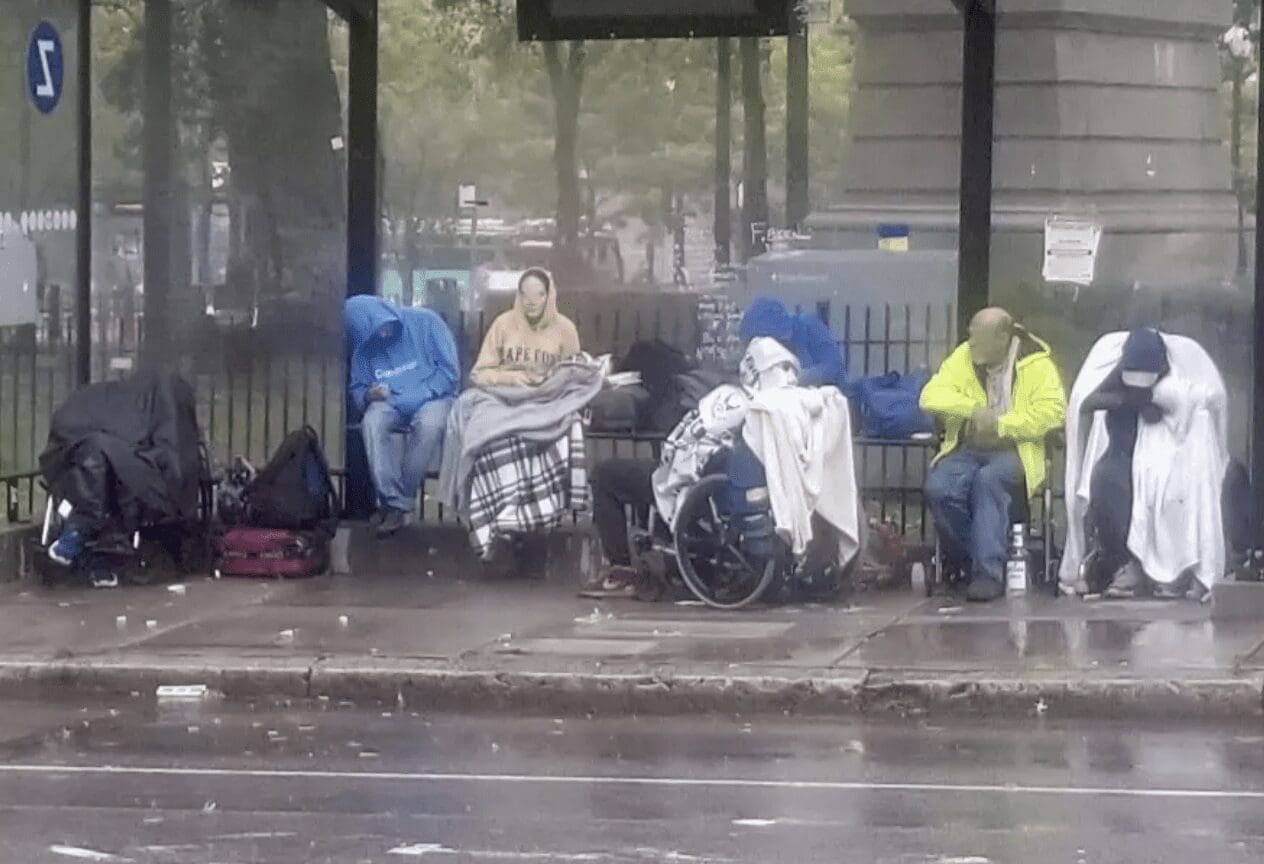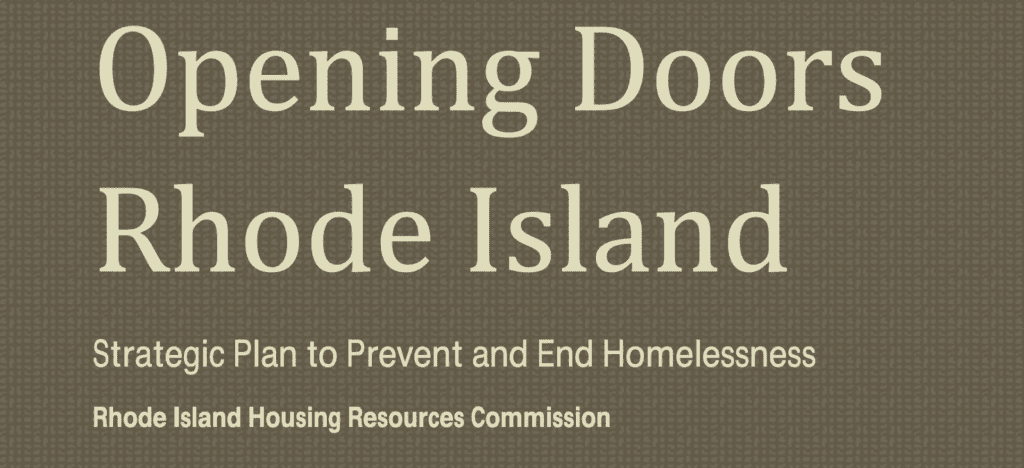Search Posts
Recent Posts
- Senior Agenda Coalition of RI pushes wealth tax to fund programs for older residents – Herb Weiss June 2, 2025
- How will Artificial Intelligence (AI) impact the future of work – Mary T. O’Sullivan June 2, 2025
- Real Estate in RI: Tiverton contemporary for $1.27M June 2, 2025
- Our Networking Pick of the Week: Coffee Hour at Provence Sur Mer, Newport June 2, 2025
- Rhode Island Weather for June 2, 2025 – Jack Donnelly June 2, 2025
Categories
Subscribe!
Thanks for subscribing! Please check your email for further instructions.

Homeless in RI: An update and looking back a decade on the saddest story of 2022
Homeless in RI: An Update
As we close the year, we note that as many as 1,000 people (depending on who is counting) are ushering in the New Year homeless, some living on the streets, or in the woods and parking lot cars.
The new housing position of Josh Saal technically doesn’t begin until January 1st, 2023 and a whole department is being planned in the state budget. One of their first directives will be to author a strategic plan to end homelessness.
Ten years ago the state developed such a plan – it was called “Opening Doors Rhode Island
Strategic Plan to Prevent and End Homelessness”. It was a report compiled with private and public agencies. The report, in many ways, could have been written today. While the state writes a new plan, it might look back at the plan that was to end homelessness ten years ago – and why it didn’t work – and if there were parts in the plan that did work.
An excerpt from the plan says that we were in far worse shape in 2010 than in 2022.
Homelessness in Rhode Island (from Opening Doors Rhode Island Strategic Plan to Prevent and End Homelessness):
“In 2010, the most recent year for which data are available, about 4,400 persons were literally
homeless in Rhode Island, living in shelters, on streets, or in transitional housing for homeless
people. On any given night, over 1,100 Rhode Islanders have no home. This does not account
for the many people who live in overcrowded housing or are temporarily residing in housing in
which they have no legal right of occupancy.”
“Ending homelessness for those already homeless in Rhode Island and preventing homelessness
for those who are precariously housed and at risk of homelessness will require a range of
resources from permanent supportive housing for those with significant long term disabilities,
service enriched permanent housing for those who will require occasional support in resolving
crises and maintaining housing, transitional housing for those transitioning from institutional
settings or in a transitional period in life; and rapid re‐housing and prevention services for those
imminently entering homelessness.”
Early intervention offered hope
The report details poverty as the cause of homelessness, but offers hope in this conclusion, shown by the data: “Although nearly one in every ten households in Rhode Island is living in deep poverty and
therefore at high risk of homelessness, only 8% of those extremely low income at risk
households actually became homeless in 2010. This indicates the significant resiliency of Opening Doors Rhode Island households in deep poverty as the overwhelming majority is able to piece together sufficient resources to avoid becoming homeless.”
The program noted a turnaround would be necessary from primarily opening emergency shelter/housing to offering supportive programs to secure permanent housing – a “transformation” of the system.
Little in the report addressed the issue of drug use or mental illness, which is one clear difference in the presenting causes of continued homelessness in 2022.
The goals of the report:

To read the full report: (click on image or link below):
___
RINewsToday has been shining the light on this growing problem going back to when our feature writer took photos of those with disabilities gathered in Kennedy Plaza’s Burnside Park in September – we did a story at that time and noted that within a week or so all the the homeless there had disappeared from sight.
___
Children living outside – our obligation to report
RINewsToday was also the first to raise the issue of children potentially living outside, in our story on December 15th – that story prompted DCYF and the Governor of Rhode Island to demand reporting of any children living outdoors or in unsafe conditions and instructed the homeless service agencies’ staff to do so.
___
Update on the Cranston Street Armory warming shelter:
Earlier this week the Armory had 150 people sleeping overnight. The facility was originally intended to hold 60 and was approved by fire inspection officials for “under 100”, for use of the ballroom, only. The overflow slept on the floor, according to Eileen Hayes, head of Amos House, the nonprofit contracted to run the facility. David Patten, Director of the Division of Capital Asset Management and Maintenance, in charge of the Armory, said that the overflow used the drill hall, which is a massive open area as big as 2 or 3 football fields, where hundreds could be.
On January 10th at 1pm there will be an emergency meeting of the fire board of appeals to get a status report on the use of the building, which has been approved until April. Patten said that at some point there would have to be a cap, most likely at 150 people, put into place. The intended use of the drill hall was to watch the World Cup Soccer games a few weeks ago, but that didn’t happen because “the needs of the homeless took priority”, said Patten. Patten said there are mobile restrooms and 2 or 3 times a week a shower truck comes to the parking lot. Patten said, “at some point we may have to turn people away. What is needed is a permanent solution. That is what Josh Saal’s office is working on. Not only for this year, but for future years.” Patten also noted that it is more a case of staff to be with the Armory people than it is space.
Hayes said in a television interview that since the first night 2 people have been placed in housing; 2 men were placed back into nursing homes; 5 people “got necessary treatment” – also notes case managers arrive next week.
___
Memorial Hospital is so much more than meets the eye
After a sprinkler burst forced the relocation of 87 people, Amos House — the nonprofit the state enlisted to operate a portion of the former hospital as an interim homeless shelter — stopped paying the $60,000 a month in state-subsidized rent to the owner: Lockwood Development Partners. Now, a messy backstore (ProJo description) may prevent an easy reopening of the building and a new developer – Michael Mota – has shown up pledging to get it open for the homeless.
“Approximately 30 households (87 individuals) were relocated the evening of Friday, November 18 due to a sprinkler burst at Memorial Hospital,” according to Chris Raia, spokesman for the state’s housing secretary, Josh Saal. Amos House has not paid rent to Lockwood Development Partners for the Memorial Hospital site since the sprinkler burst, having previously paid $60,000 per month.
The way it worked: Amos House used a $1,556,412 state grant last year, and $959,517 so far of a $2,058,331 state grant for this year, to pay rent and provide services at the Memorial Hospital site, Raia said to the Providence Journal.
“Amos House is currently redirecting their state funding to safely place all unhoused individuals in hotel settings, where they continue to receive shelter and services from Amos House. The state is currently working with the City of Pawtucket, Amos House and the property owners to explore options to reopen the Memorial Hospital site.”
“The state’s goal remains to safely reopen the former Memorial Hospital site for emergency shelter at its previous or greater capacity,” Raia told The Journal.
___
Governor McKee at close of year
In an interview in the Providence Journal Gov. McKee said, “I think there’s five new positions that the secretary could bring on. But that just scratches the surface,” he said. “We’re going to work with the General Assembly to establish that office…And I believe that we should be able to get a jump-start on that by amending the current budget, and we’ll be prepared to do that in January.” –
McKee blames the advocates themselves for failing to tell him the location of 80 rumored homeless encampments. “We’ve requested where the 80 encampments are. … We’re not getting that information. We requested where the [homeless] children might be, and we’re not getting that information. So we need to make sure we’re zeroing in on the right numbers … the numbers we need to provide services,” he said.
McKee is also frustrated that funding was allotted at one point for 350 new shelter beds and, for reasons that are not yet fully clear, roughly 150 of those beds did not materialize. We’re going to work with the providers that agreed to be able to open these beds. I don’t think it’s an overnight light switch for them, obviously. … [But} I think we should be working together to try to figure out how to open those beds,” he said.
The Housing Department managed by Josh Saal actually comes into effect on January 1st, officially. They will be seeking input from consultants on strategy moving forward.
___
Incoming Providence Mayor Smiley
As winter begins, Mayor Smiley said he didn’t see the city taking immediate action on this housing issue of the homeless. He points to the 24-hour warming center housed in the Cranston Street Armory until April 15 as a refuge from the cold for the city’s homeless. He also said about the state being unprepared or caught off-guard about this year’s crisis: “Frankly, they should’ve been queued up and ready to go as soon as the weather started to turn,” Smiley said. “Winter comes every year. We knew this was coming, and so the state leaders seem to have kind of sprung into action now.” He noted that the city and the state can work together, “I don’t think there’s any unilateral action that the city can or should take. I think we all need to work together.”
___
Creative solutions to support the homeless in New York
In New York, the state’s first legal “pot shop” was opened by Housing Works, a 31 year old nonprofit that helps the state’s homeless, HIV-positive population and has raised funds via thrift stores selling 2nd hand designer clothes, used books, and its own activism-inspired merchandise – the new division will be called House Works Cannabis Co.
___
Mental Health front and center in homeless crisis
No one needed to be reminded that chronic homelessness and a hesitancy to go to shelters, with a preference to stay outside is partners with substance use and mental illness. A reminder came this week when Dennis Eckersley’s adopted daughter was in the news Christmas day as she delivered a premature baby in a homeless encampment, and then couldn’t find the baby to direct officials to. She apparently has dealt with mental illness all her life. The Eckersley family said that once she turned 20 they could not direct nor control her actions, and that “as in most states the mental health system is broken. Without adequate inpatient beds for crisis, treatment, and stabilization, a state mental health system fails.” The family said they hope now that she will accept treatment. The family has sought legal guardianship of the child, who was finally located and survived.
___
Follow our series, Homeless in RI –
More stories, here: https://rinewstoday.com/?s=homeless

